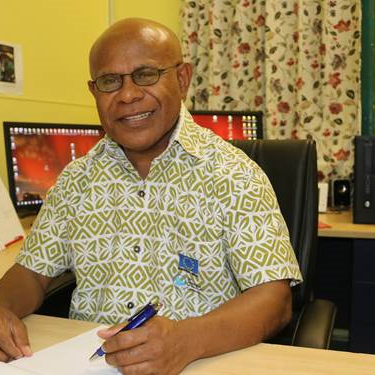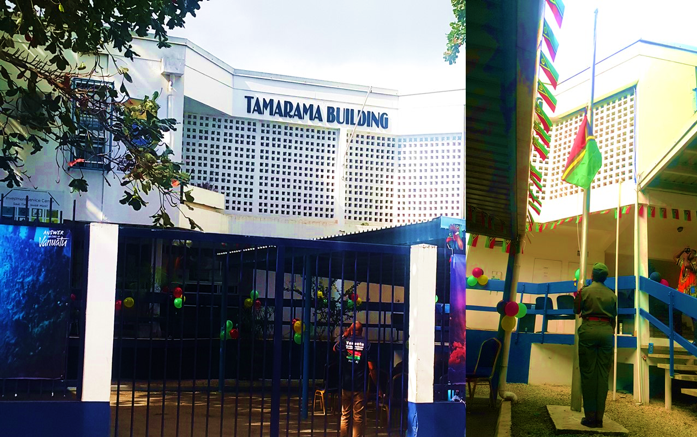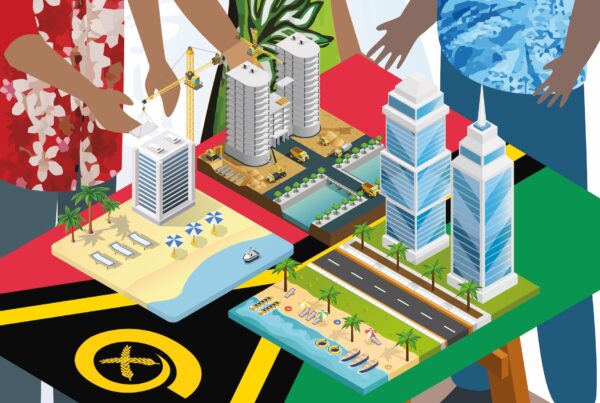By Howard Aru
On Thursday this week, for the first time the joint institutions of the ‘One-Stop-Shop’ – VFIPA, Labour, Immigration and VTO – gathered together to celebrate their first ever flag raising ceremony at the Tamarama Building since moving into it in early December 2017.
On behalf of the team I thank the VCC Chairman Pr. Allan Nafuki, the VMF, Chair and members of the VFIPA Board, staff and friends for being there to witness this historic occasion as we prepare for the big Victory Parade next Thursday to kick start the “Yumi 40” national celebrations.
Believe it or not, it took 20 long years before we finally came together as a ‘One-Stop-Shop’ for foreign investors. I referred in greater detail to it two weeks ago.
VFIB and MNVB
When the Vanuatu Foreign Investment Board (VFIB) was established in 1998, it wasn’t alone. The reforms mandated the creation of a sister institution to take care of Ni-Vanuatu business development interests – the so-called ‘Ministry of Ni-Vanuatu Business’ (MNVB). The latter enjoyed the benefits of a ‘No-strings-attached’ VT 100 million Chinese Government grant, while the VFIB struggled to survive, barely by the skin of its teeth. VFIB grew out of passion and faith. I recall one morning our Head of Investment promotion division back then (who happens to be the current Minister of Finance Johnny Koanapo) calling us into the conference room at the Department of Trade and Industry suggesting that we pray about VFIB’s relocation.
We did. The following week we moved ‘by faith’ to our new home at Pilioko House. We had very little money and lacked resources. The Australian High Commission graciously donated a number of used (2nd hand) chairs to furnish our humble Boardroom with. VFIPA is better off today, though it could have been equipped with more resources to fulfill its mandate of ‘promotion’. I won’t go into details re: the other institution – the MNVB, except to say that to this very day there’s not a single record around of how the Vt.100 million was spent. The MNVB almost died a natural death had it not been rescued by an amalgamation into the current Ministry of Trade and Tourism.
Two burning Issues
A former senior state Minister wrote the following lines to Inside Viewpoints a few days ago expressing support for our defense of Key Positions (KPs). He argues, “apart from providing jobs through FDI, one of the most critical reasons why we must have FDI is that…one of the main measures of GDP is FDI.” No FDI, no GDP growth. There’s the latest debate upholding ‘Wellbeing’ as an alternative means to measuring progress. But until such time that this new tool is accepted and fully built into our national structures, we will still continue to measure progress through GDP.
Two vital points need to be stressed here. Firstly, the failure of some to advance the vision to drive the MNVB is very unfortunate. Successive Governments, VFIPA Boards, CEOs and staff since 1998 played their part to advance the cause of FDI in Vanuatu. Despite ongoing challenges, VFIPA will continue to deliver on its core mandate. Second point, we need to approach KPs with extreme caution. Tampering with these KPs will halt expansion of existing projects and commitments by new ones. The Government then loses out on forgone taxes to raise revenue, no jobs created and thus no income for our growing unemployed population. Social media recently debated ‘jobs for Ni-Vans’ without giving due consideration to the deeper implications on FDI and on the economy itself. Whist ordinary people will share their views, leaders need to think more strategically about both sides of the debate, and make informed judgements and decisions based on global best-practice and facts.
This leaves us with one final point, and it relates to training and skills development.
Special Skills Training, FDI, and Localization
To commence on the road to our next 40 years, we have to urgently address the issue of special skills training if we want to seriously talk about “Localization of jobs” in the long term. Both VFIPA and the Department of Labour are caught at the receiving end of other policy mechanisms that appear to be outdated and dysfunctional. These must be addressed swiftly. To be more specific, our education and training sector needs to refocus especially where special training and skills are needed, for private sector-type employment. We need to be demand driven from now on rather than supply driven.
What happened to our Trade Testing ‘school’? Buried in relics of history and now we have a foreign-owned retail shop located on the site. The so-called Vanuatu Institute of Technology (or INTV) appears to be lost in the woods. We all heard the warning issued to INTV on national TV by the CEO of VQA last year. INTV has lost the plot. With APTC onboard I am confident something seriously good will emerge out of it and of course our USP Emalus Campus in terms of connectivity to addressing the special skills issue referred to above. Time is not on our side. We have to make some major decisions about this sooner than later.
Last but most important of all, from very reliable experienced sources, the issue with our localization challenge ‘is not a labour issue but an educational one’ . We have not provided sufficient education and training to target important positions in the private sector. In essence, we say we want Independence but by our lack of vision and strategic action on the education and training side of things we show others that we can’t be bothered to create Independence.
We can’t really force foreign investors to recruit us if on our part we lack those skills and capacity. We need to find a common way out – the Government and the private sector community together.
As we gear up to celebrate ‘Yumi 40’, we need to think more deeply about our educational and training institutions. In development, nothing falls from the sky. We have to work hard to achieve it! I sincerely believe we can, if we commit soul and mind to it.

Mr Howard Aru is the Chief Executive Officer of the Vanuatu Foreign Investment Promotion Agency and former Director General of the Ministry of Agriculture, Livestock, Forestry, Fisheries & Biosecurity and Ministry of Health.





